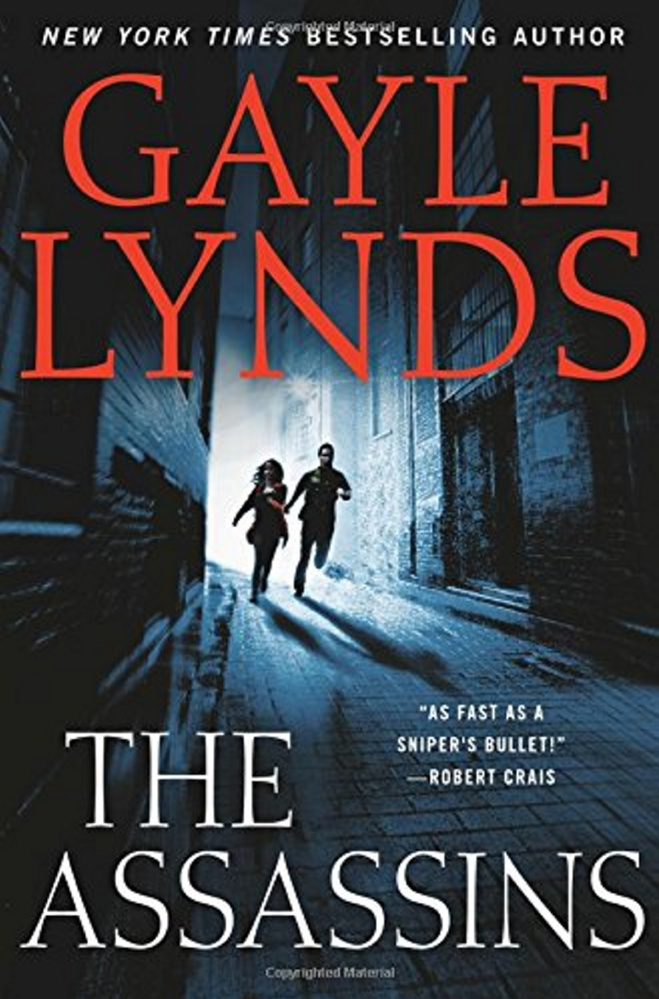Six men find their way through the back streets of Baghdad toward the National Museum of Iraq in early April 2003, after the fall of Saddam Hussein, their faces masked by scarves, heavily armed against any surprises they might encounter.
They are a mixed group of international assassins formerly hired by Saddam, seeking now to steal a precious tablet from antiquity to recoup the second payment they never received after the ruler’s fall.
Inside the museum, they encounter Republican Guards that interrupt their getaway, causing one of the men to drop the tablet, which fractures into a dozen pieces. Several are wounded, one seriously, but he is not abandoned. The thieves quickly gather up the pieces of the tablet and make their getaway into the night.
This is the opening of best-selling author Gayle Lynds’ international espionage thriller, “The Assassins,” originally published in hardback, recently released in paperback. Everyone makes it out alive, but barely. They disperse, the tablet fragments scattering with each of them as well.
The leader, Burleigh Morgan, a Brit, recovers from multiple wounds in Beirut, then goes on to Cairo. He emails his comrades that the tablet could still be valuable, and they should assemble the pieces. Members of his team from around the world reply skeptically.
Several years later, he leaves the apartment of his girlfriend, goes out to get in his Cobra, and a devastating explosion leaves nothing but smoke and the mangled wreckage of his car.
“This was not just about murdering some old assassin,” Lynds writes. “Someone powerful had sent a message.”
Once there were six assassins with pieces of an ancient Sumerian tablet – and then there were only five.
“The Assassins” is a taut and cleverly crafted thriller with layer upon layer of complexity woven into the unfolding tale from the start.
Maine writer Lynds exhibits compelling command of the narrative, but also of the shadowy realm of professional assassins and the geo-political world they traffic in.
Such professionals do not refer to their specialty as assassinations or killings, but rather as “wet work.” No two are alike, and Lynds presents a rogues’ gallery that is as diverse as it is fascinating.
There is the Padre, a former Basque separatist who dresses to appear as a kindly Catholic priest and is looking for the Carnivore, whom the Padre believes is coming after him. The Carnivore, the so-called “assassin without a face” nobody has ever been able to identify because of his mastery of disguise, is also a master of making his kills look like accidents, suicides or natural deaths.
There is also Eli Eichel, the Choirmaster, who is ex-Mossad; and Krot, who is ex-KGB; and Seymore, who is an Islamic jihadist.
The story moves from Baghdad to Cairo to Paris and then London. From Washington, D.C. and environs, to Marrakesh and back to Baghdad.
The narrative turns around Judd Ryder, an assassin for a black-op CIA unit, and Eva Blake, a former curator of antiquities for the Getty Museum who is in training at Langley to become a CIA operative.
Early in the story, Ryder returns a day early from Baghdad, where he’s been on assignment. As he approaches his home on a snowy night, he sees someone walk out the front door: his identical double. As the double starts to cross the street, he gets mowed over in a hit-and-run.
The Padre proves to be behind both the creation of the double, and his public murder. He is also responsible for the subsequent kidnapping of Eva, only “Eva” is also a double he’s created. Both acts were designed as cover, the latter to entice Ryder to try to rescue Blake, so the Padre can capture and interrogate him about the whereabouts of the Carnivore, for whom the two previously worked.
Things don’t turn out well for the Padre, nor for other members of the assassins team from Baghdad. Ryder and Blake come to suspect something other than the desire of one assassin to collect all the fragments of the tablet is at play. But what?
There are more twists in the plot than turns in the meandering streets of Marrakesh. Nobody seems to be who they say they are, and nothing is as it appears. Alliances and double-crosses abound.
Assassins are, by their nature, loners who do not trust anyone, and Lynds has created a resonating echo among some of them that the loneliness and life in the shadows is wearisome, spawning a desire for normalcy and respectability – and even love.
The drama never lags in “The Assassins.” At nearly 500 pages, it is still a fast read. The ending is richly satisfying, though a reader never sees it coming.
Frank O Smith is a Maine writer whose novel “Dream Singer” was named a Notable Book of the Year in Literary Fiction in 2014 by Shelf Unbound, an international review magazine. “Dream Singer” was also a finalist for the Bellwether Prize, created by novelist Barbara Kingsolver “in support of a literature of social change.” Smith can be reached via:
frankosmithstories.com
Send questions/comments to the editors.



Success. Please wait for the page to reload. If the page does not reload within 5 seconds, please refresh the page.
Enter your email and password to access comments.
Hi, to comment on stories you must . This profile is in addition to your subscription and website login.
Already have a commenting profile? .
Invalid username/password.
Please check your email to confirm and complete your registration.
Only subscribers are eligible to post comments. Please subscribe or login first for digital access. Here’s why.
Use the form below to reset your password. When you've submitted your account email, we will send an email with a reset code.